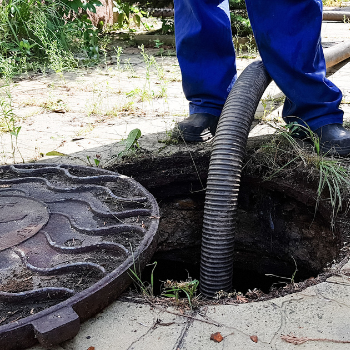Common Sewer Line Pipe Issues
 The sewer line on your property safely diverts wastewater from the kitchen and bathrooms away from your home. These pipes are nearly always buried underground and may pass through your foundation.
The sewer line on your property safely diverts wastewater from the kitchen and bathrooms away from your home. These pipes are nearly always buried underground and may pass through your foundation.
Over time, the combination of location and wear and tear can damage the sewer line. Factors like corrosion, clogs, a shifting foundation, tree roots or exposure to rainwater and sun can alter the sewer pipe’s composition. If you suddenly notice slow moving water, backups or a strong odor, learn what might be wrong with the sewer line.
How Does the Sewer Line Work?
The sewer line is essentially your home’s largest drain and the plumbing system’s most crucial part. Within your region’s network of pipes, it transports all wastewater to the main sewer.
Sewer pipes are typically buried underground and this arrangement exposes them to a range of factors:
- Rainwater
- UV exposure and heat from the sun
- Shifting soil
- Tree roots
These aspects can cause the sewer line to break down or experience a clog resulting in a backup. Combined with standard plumbing issues, your sewer line may experience the following issues.
Corrosion
If your sewer line uses metal pipes, corrosion remains a risk due to the material coming in contact with wastewater and all that it contains. Corrosion develops gradually and may have persisted for years. It can result in weak rusted areas, leaks and large gaps that cause sewage to leak into the soil and grass making up your lawn.
For its strength, metal remains the preferred material for sewer lines over Orangeburg and plastic. To anticipate corrosion, avoid tossing or flushing anything acidic down the drain.
Shifting Pipes
An unstable foundation or shifting grounds can result in more than cracks that spread through the walls. Whether due to a home’s age, construction of the neighborhood, how much rain the area experiences and the soil underneath, these changes can also affect your plumbing. Based on where the pipes are located, shifting can result in:
- A distorted pipe shape
- A bent pipe
- A full break in the pipe
- Leaks and cracks near joints, including a complete pipe separation
- Interruption in water flow from your home to the sewer line
Considering these potential changes, you’re advised to have a plumber inspect the sewer pipes every couple of years.
Clogs
A clogged sewer line becomes far more serious than an ordinary pipe. Raw sewage backs up and eventually flows into your home. Clogs develop in your sewer line for three main reasons:
- The backflow prevention system no longer works effectively. The pressure placed on pipes may occur as a result of rain showers causing an excess of water to flow into the main sewer line. Individual sewer lines no longer work as efficiently and malfunctioning back-flow devices cause the sewer water to pass up through drains and toilets.
- Items in the wastewater that can’t dissolve. This may be the result of flushing items other than toilet paper down your toilet, throwing certain items down the sink drain or a gradual accumulation of particles from the wastewater.
- Gravity can play a factor due to how the pipe is angled. Based on shifting soil or as a result of the home’s design, water may not flow efficiently through the pipes and pool in one area.
In all instances, homeowners tend to smell the sewage around sinks and toilets before it flows back up.
Tree Roots
Tree roots entering and growing into the pipes are primarily an issue with older Orangeburg and clay materials. Yet especially if the pipe has sprung a leak or started to separate near a joint, the root has an opportunity to find water and begin growing inside.
This pattern starts with smaller roots passing through a gap or crack. Once there, the roots take in water, begin to expand and start growing inside the pipe. Eventually, water passes at a slower pace through the sewer line and a backup results. Especially if you keep your pipes clear and notice gurgling sounds or slower flow through your pipes, roots could be behind this change.
Cracked Sewer Line
Often, a sour or gas-like smell indicates your sewer line has a crack, especially if you notice this scent around the bathtub or sink.
In addition to a shifting foundation and grounds, a sewer line has potential to crack due to a blockage causing water inside to place pressure on the pipe. Once this occurs, wastewater leaks out where it pools or gets absorbed by the ground. This routine accumulation subsequently exposes you to sewage and becomes a health hazard for your family and the rest of the neighborhood.
Smell of Sewer Gas
A strange smell in your home could be the accumulation of sewer gas. This odor is often the result of a house trap with a missing cover or loose drain cap. It may also be due to a crack in the sewer line that’s causing sewer gas or wastewater to leak in or around your home.
Are you concerned about your home’s sewer line? Contact MJ Fahy & Sons for a thorough sewer line inspection and recommendations.




